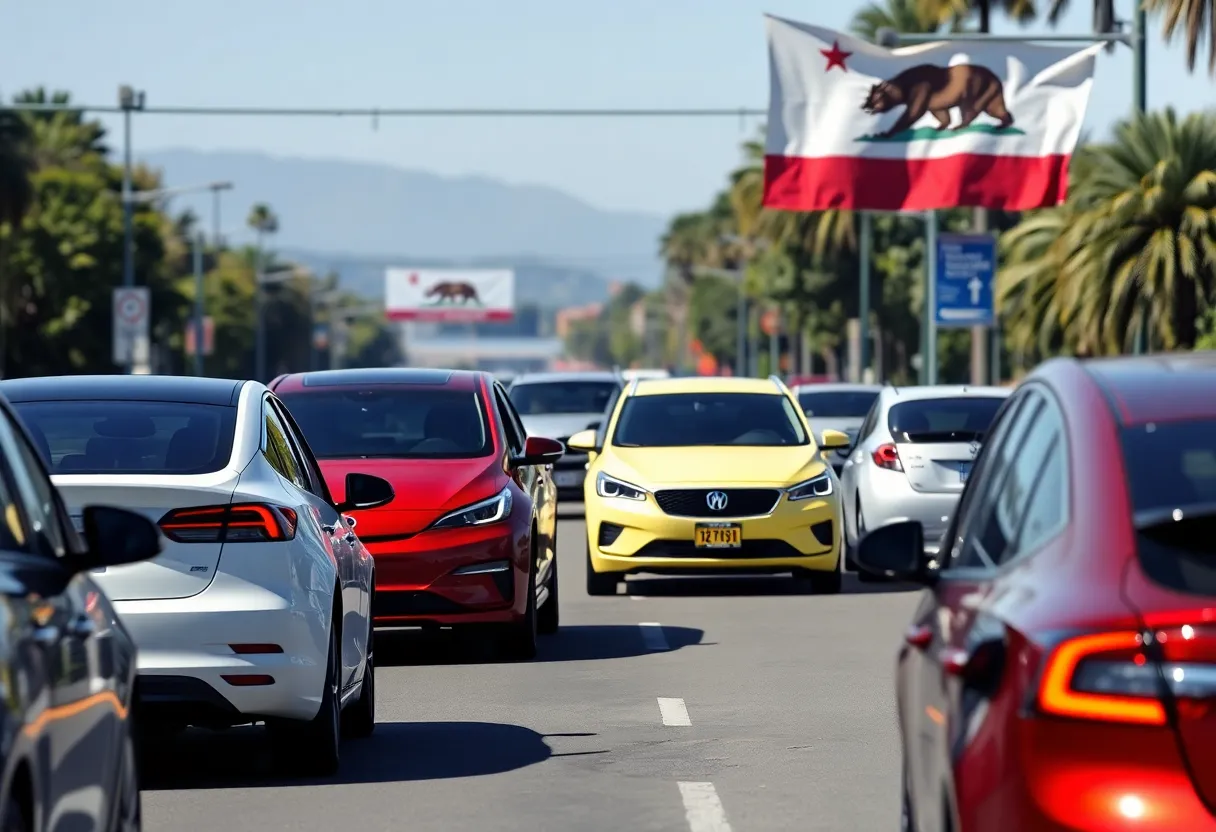News Summary
California’s plan to ban new gas-powered vehicles by 2035 is under threat as Congress prepares to vote on measures that could block the initiative. The GOP-controlled Congress is targeting stricter emissions regulations imposed by California, raising concerns over consumer impact and the electric grid. Governor Gavin Newsom argues the congressional actions could be illegal and warns of potential legal action. The state aims for significant emissions reductions and a push towards electric vehicles, but challenges, including infrastructure limitations, persist amidst the political battle.
California is facing a significant challenge to its ambitious plan to ban the sale of new gas-powered vehicles by 2035, as Congress is set to vote on measures that could block this initiative. A Senate vote could happen as soon as this week, which could significantly impede California’s progressive shift toward electric vehicles (EVs).
California represents approximately 11% of the entire U.S. car market, giving it profound influence over automobile purchasing trends nationwide. The vehicles on the road are major contributors to planet-warming emissions, emphasizing the importance of California’s efforts to lead in environmental reforms. The GOP-controlled Congress is specifically targeting three California waivers that impose stricter emissions regulations than federal standards, a move that follows a House vote aimed at blocking these regulations.
Senate Majority Leader John Thune has voiced concerns that California’s regulations overextend the authority of the Clean Air Act and could pose risks to consumers, the economy, and the energy supply. In response, California Governor Gavin Newsom and state air regulators argue that these congressional actions could be deemed illegal, warning they may pursue legal action if Congress proceeds with the blockade.
Historically, the Environmental Protection Agency (EPA) has allowed California to set more stringent emissions guidelines, which other states can choose to adopt. These initiatives date back to the 1960s and 1970s when the state began tackling severe air pollution issues. During the Trump administration, California’s ability to enforce its own standards was curtailed, but this capability was restored under President Biden in 2022.
California’s gas car ban was initially announced in 2020 and formalized in 2022, with federal approval granted the following year. Automakers are mandated to progressively increase their sales of zero-emission vehicles, targeting 43% by 2027, 68% by 2030, and reaching 100% by 2035. Despite the ban, consumers will still have the option to purchase used gas vehicles, plug-in hybrids, and hydrogen-powered cars.
In addition to the ban on new gas-powered vehicles, California has imposed other stringent regulations, including a 2020 rule to phase out new medium- and heavy-duty diesel vehicles. According to these rules, 40-75% of sales in this category must consist of zero-emission trucks by 2035. Another regulation focuses on air pollution from trucks, enforcing stricter emissions compliance tests and accountability measures.
A number of states, such as New York, Colorado, and New Mexico, have indicated their intention to follow California’s example. Some automakers, including Honda, Ford, and Volkswagen, have reached agreements to comply with California’s emission standards; however, they have not committed to supporting the 2035 ban should it be obstructed.
The National Automobile Dealers Association has endorsed the Senate measure, emphasizing the necessity for a national consensus on vehicle regulations. Concerns have surfaced regarding California’s capacity to support an increase in electric vehicle demand, particularly given past difficulties with its power grid during heat waves.
The Newsom administration asserts that efforts are underway to boost the electric grid’s capacity and infrastructure to accommodate a growing number of electric vehicles. California aims for net-zero greenhouse gas emissions by 2045 but presently lacks the necessary infrastructure to support this ambition. Currently, there are about 84,000 public EV chargers across the state, with plans to expand this number to 1.2 million by 2030.
Despite California’s push for EV infrastructure, the Trump administration previously instructed states to cease funding electric vehicle initiatives established under the Biden administration. While eleven states and Washington, D.C., have adopted California’s goal to phase out new gas-powered vehicles, some are reconsidering their commitments. Vermont’s governor has temporarily halted enforcement of electric vehicle sales targets due to concerns about pacing, while Delaware’s governor is looking to rescind their existing EV mandate.
As congressional Republicans, including Thune, argue that California’s plans may overburden the state’s electric grid, experts note the potential for local infrastructure to become overloaded, despite theoretical capacity in many regions. If Congress moves ahead with obstructing California’s regulations, the state may need to search for alternative strategies to achieve its emissions reduction goals and promote innovation in the automotive sector.
Deeper Dive: News & Info About This Topic
- The New York Times: Trump’s Challenge to California’s Gas Car Ban
- Wikipedia: Electric Vehicle
- Clean Technica: Top Selling EVs in California
- Google Search: California electric vehicle infrastructure
- Autoblog: California’s Ban on Gas-Powered Cars
- Google Scholar: California vehicle emissions regulations
- San Francisco Chronicle: The Cost of Electric Cars in California
- Encyclopedia Britannica: Environmental Regulations
- Politico: California’s Legal Battle Over EV Rules
- Google News: California emissions standards








